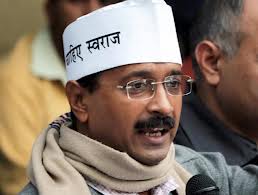
“We are ready for it (re-election). At present, we will neither take, nor extend support to either the BJP or the Congress to form the government. But unlike this election, the next election would be contested between the BJP and the AAP, as the Congress has lost badly,” AAP national convener Arvind Kejriwal said.
The party will also change some of its candidates, who are considered weak, in case of a re-poll, Kejriwal said.
Asked about government formation, Kejriwal said as the single largest party, the BJP should form the government and take support from the Congress. “The BJP has been given the mandate. It is the single largest party. So, it should try and form the government taking support of the Congress,” he said. The AAP leader said the similarity between the party’s election symbol “broom” and “torch”, which was given to some “dummy” independent candidates in about eight to nine constituencies, was the reason they lost in those constituencies.
He said exit polls also harmed the party, as the results came in the evening but polling continued till 9:30 pm.
“Because of this, most of these votes were polled in favour of the BJP,” Kejriwal said. “In these constituencies, the AAP lost by a wafer-thin margin.”
Kejriwal’s assertion came after the Congress on?Tuesday gave indications of extending outside support to a government in Delhi headed by the AAP.
Congress sources said eight party MLAs met All India Congress Committee general secretary in charge of Delhi Shakeel Ahmed during the day and floated the idea of backing the AAP government.
Ahmed told reporters that some Delhi leaders were keen on giving unconditional support to the AAP to form the government. “Any decision on the issue will be taken by the party high command,” he said.
However, Congress spokesperson Raj Babbar during a press briefing did not mention the Delhi Congress leaders’ view of backing the AAP.
He said since the BJP (32 seats) and the AAP (28 seats) have emerged as the two big parties in the House, they should honour the mandate by forming the government in Delhi. On a day when the Election Commission notified the results of Delhi Assembly elections, BJP’s chief ministerial candidate Harsh Vardhan continued to claim that the party lacked the numbers and it was not looking at government formation.
Harsh Vardhan was also elected leader of the legislature party at the first meeting of 31 BJP lawmakers and the lone legislator from party ally Shiromani Akali Dal at the Delhi unit office.
Soon after the meeting, he said: “We cannot form a government due to a fractured mandate. We are ready to fight the election again, if required.”
Kejriwal tweeted during the day that his party would neither take nor give support to the BJP or the Congress.
He told reporters: “Let the BJP and the Congress join hands (to form the government) as they are like-minded parties. We are a small party, we have small numbers and lack the means to form the government with 28 legislators.”
The AAP heavyweight, who defeated chief minister Sheila Dikshit in the New Delhi constituency, seemed to be in a damage-control mode over party colleague Prashant Bhushan’s reported comment on a hypothetical situation in which they could support the BJP in government formation.
"There is no question of supporting the BJP. What Prashant said on Monday was his personal opinion," he tweeted.
Bhushan told a TV channel on Monday that the AAP “may consider” supporting the BJP if the party gives in writing that it will pass the Jan Lokpal Bill.
As the spectre of a re-poll loomed over the city—an exercise that costs about Rs 40 crore —TV channels started interviewing people on their opinion whether the city could afford another election.





Comments
Add new comment